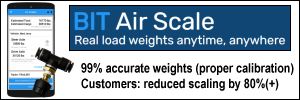Notice: Owner-Operator Independent Drivers Association: Small Business in Transportation Coalition Petitions for Rulemaking; Transparency in Property Broker Transactions
Docket ID: FMCSA-2020-0150-0001
https://www.regulations.gov/document?D=FMCSA-2020-0150-0001

Written on October 19, 2020, by Vicki Simons, President
NKBJ InfoNet, LLC
Truck-Drivers-Money-Saving-Tips.com
According to the Electronic Code of Federal Regulations, 49 CFR § 371.3:
§ 371.3 Records to be kept by brokers.
(a) A broker shall keep a record of each transaction. For purposes of this section, brokers may keep master lists of consignors and the address and registration number of the carrier, rather than repeating this information for each transaction. The record shall show:
(1) The name and address of the consignor;
(2) The name, address, and registration number of the originating motor carrier;
(3) The bill of lading or freight bill number;
(4) The amount of compensation received by the broker for the brokerage service performed and the name of the payer;
(5) A description of any non-brokerage service performed in connection with each shipment or other activity, the amount of compensation received for the service, and the name of the payer; and
(6) The amount of any freight charges collected by the broker and the date of payment to the carrier.
(b) Brokers shall keep the records required by this section for a period of three years.
(c) Each party to a brokered transaction has the right to review the record of the transaction required to be kept by these rules.
[45 FR 68942, Oct. 17, 1980. Redesignated at 61 FR 54707, Oct. 21, 1996, as amended at 62 FR 15421, Apr. 1, 1997]
Background
The current requirements under 49 CFR 371.3(c) were adopted by the Interstate Commerce Commission (ICC) on October 17, 1980 (45 FR 68941), at 49 CFR 1045.3(c). Prior to 1980, the broker records requirements under 49 CFR 1045.3 did not include a specific provision concerning the rights of parties to a brokered transaction to review the record of the transaction. In its May 12, 1980 (45 FR 31140) notice of proposed rulemaking concerning multiple broker regulations, the ICC explained that the proposed change to section 1045(c) would allow the agency to “. . . eliminate more complex rules found at sections 1045.5, 1045.6, and 1045.10.” Those requirements related to charges for brokerage services, charges for non-brokerage services, and duties and obligations of brokers, respectively.
With the termination of the ICC in 1995, the regulatory oversight of brokers was transferred to the Federal Highway Administration (FHWA) and the requirements under 49 CFR 1045.3 were redesignated, without change, under 49 CFR 371.3 (61 FR 54707; October 21, 1996). Subsequently, with the establishment of FMCSA in 2000, all motor carrier oversight responsibilities and regulations were transferred from FHWA to FMCSA.
Petitions for Rulemaking
Owner-Operator Independent Drivers Association (OOIDA)
OOIDA requested that:
- FMCSA amend 49 CFR 371.3 to require brokers to provide an electronic copy of each transaction record automatically within 48 hours after the contractual service has been completed; and
- FMCSA explicitly prohibit brokers from including any provision in their contracts that requires a carrier to waive their rights to access the transaction records required by section 371.3.
Small Business in Transportation Coalition (SBTC)
The SBTC requested that FMCSA amend 49 CFR 371.3 to prohibit brokers from coercing or otherwise requiring parties to a transaction to waive their right to review the record of the transaction as a condition of doing business. The requested language would also state that “No stipulation or clause in any contract shall exempt any broker from having to comply with this rule, upon demand, by a party to the transaction.”
Answering Questions
Question 1a: In light of the significant statutory changes reducing the scope of regulatory authority over commercial transportation that have occurred since 1980, what statutory provisions, if any, would be carried out by the regulatory changes requested by the petitioners? Answer 1a: The only statutory provisions that may need to be carried out by the regulatory changes requested by the petitioners would include:
- A system through which to report the failure of brokers to provide the information that they are required by law to provide;
- The means by which brokers will be held accountable for their failure to provide information as required by law; and
- Penalties for violating the law, with escalating penalties for repeat violations.
Question 1b: In particular, how would a rule restricting the rights of private parties from including certain terms in their agreements align with the Agency’s statutory authority? Answer 1b: What “terms” of private parties would be in agreements that must not be shared with the carrier under 49 CFR § 371.3? This seems like stonewalling.
Question 2a: How would a rulemaking expanding FMCSA’s role in enforcement of the requirement mandating that brokers automatically disclose financial details about each transaction to the respective motor carrier transporting the load, as requested in the OOIDA and SBTC petitions, align with the statutes identified above? Answer 2a: The federal law is already in place and is quite clear.
Question 2b: What measures could FMCSA take to ensure that regulatory action in this area is an appropriate exercise of the Agency’s authority? Answer 2b: Provide a checklist to the brokers of all of the information that must be sent to carriers in a standardized format (much like the Nutrition Facts label on packaged foods and drinks, updated by the U.S. Food and Drug Administration (FDA)). Brokers could set up a very simple system like a mail merge from an Excel spreadsheet to print out the info in an email — or upload this information to the cloud for easy retrieval — for each and every load. Since emails are easily lost or filtered in our day, cloud retrieval via a URL that is posted in the contract or agreement would be ideal.
Question 3: Are the transparency issues raised by OOIDA and SBTC limited to small brokers or large brokers (e.g., brokers with revenues above a certain threshold, brokers with a certain number of transactions, etc.) or are they more widespread such that the rulemaking should cover all brokers, regardless of size? Answer 3: The transparency rulemaking needs to cover all brokers regardless of size.
Question 4: If the transparency issues are primarily associated with large brokers, what revenue threshold should the FMCSA consider for the applicability of any new requirements, and how would the Agency obtain accurate information about brokers’ revenues? Answer 4: Transparency issues need to cover all brokers regardless of size.
Question 5: Should each broker have, for example, a stand-alone system with motor carriers receiving an email from the broker after the contractual service has been completed, or should brokers be allowed to satisfy the request with partnerships or networks through which registered brokers would upload transaction information which would then be automatically transmitted via the network to the registered carrier associated with the transaction? Answer 5: As was answered for Question 2b above, brokers could set up a very simple system like a mail merge from an Excel spreadsheet to print out the info in an email — or upload this information to the cloud for easy retrieval — for each and every load. Since emails are easily lost or filtered in our day, cloud retrieval via a URL that is posted in the contract or agreement would be ideal.
Question 6: The OOIDA petition request that FMCSA require brokers to provide transaction information automatically within 48 hours of the completion of the contractual services would likely require information technology (IT) resources that are currently not in use. FMCSA requests that commenters provide cost estimates for implementing an IT solution to accomplish OOIDA’s request, either through stand-alone systems run by individual brokers, or systems operated by groups of brokers notifying the individual carriers utilizing any of the brokers within the group. Answer 6: As doubtless all computers used by brokerages that handle contracts contain office software including spreadsheet, mail merge, and email capabilities, no stand-alone systems are required. Once a computer program has been put in place to fill in information in the standardized format suggested above, it should take only a few seconds to generate and send the information.
Question 7: Please provide a quantitative estimate of the economic benefits that would likely be achieved by motor carriers if FMCSA adopted the rules OOIDA and SBTC requests. How much additional revenue might motor carriers receive on a per-transaction basis? Answer 7: When brokers provide the information that they are required to disclose by law, this will help all carriers. Because margins of profit seem to be mostly unknown at present, it is impossible to estimate the additional revenue that motor carriers might receive.
Question 8: Please provide a quantitative estimate of the economic costs to brokers or others if FMCSA adopted the rules OOIDA and SBTC request. How much profit reduction on a per-transaction basis would brokers experience, and what percentage of the costs would be passed through to shippers or motor carriers? Answer 8: As was answered for Question 6 above, as doubtless all computers used by brokerages that handle contracts contain office software including spreadsheet, mail merge, and email capabilities, no stand-alone systems are required. Once a computer program has been put in place to fill in information in the standardized format suggested above, it should take only a few seconds to generate and send the information.
Summary and Conclusion
I remind the FMCSA that 49 CFR § 371.3 already requires brokers to keep certain records and particularly (c): “Each party to a brokered transaction has the right to review the record of the transaction required to be kept by these rules.”
Sending required information to those who request it should be extremely simple.
It is past time that brokers were forced to follow the law and supply information to those who request it without pressing carriers to sign contracts waiving their rights.
In my opinion, brokers who
- voluntarily comply with the law,
- keep their profit margins within acceptable ranges, and
- have a respectable number of loads,
will find that they have a lot of business with motor carriers, owner-operators and independent truckers.
The petitions from OOIDA and SBTC sound completely reasonable to me and I urge you to approve all of them.
Vicki Simons, President
NKBJ InfoNet, LLC
Truck-Drivers-Money-Saving-Tips.com
Return from Comments to FMCSA on Broker Transparency to our About Us page or our Truck Drivers Money Saving Tips home page.

















